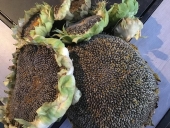Thekla McDaniels wrote:I know there are industrial presses made in India, or ? that cost in the 20,000 (US) dollars, and there are the hand crank ones that use the warmth of a candle or oil flame to warm the oil being pressed to make it flow.
Neither of these seems just right for me. Surely people were pressing oil before the industrial revolution! Does anyone have any ideas how it was done, or how to go about it?
OK, as one of the resident chemists, I'll take a stab at this along with your other question:
What is anyone growing on perennials to press for oil? I can think of olives (but who would want to burn such precious stuff), hazel and other nuts, rosehip seeds make a nice cosmetic oil, but again, would fuel oil be a good use for that?
The development of this particular bit of chemical technology is lost in antiquity and probably predates soap making -- for to make soap from ashes and fat, you have to have some nice clean fatty acid molecules. I would guess that the first oils to be kept for storage were those that congealed overnight after a big repast on some piece of fatty game. And the technology really got a boost with the invention of the clay pot. All you had to do is boil up some fat containing biomass and let it sit out in the cool of the night. In the morning, you carefully lift off the fat that has risen to the top and congealed.
Now boiling may be fine for a low-tech operation, but heating water uses a lot of fuel and fats have next to no solubility in water, so you have to make sure that cell vesicles rupture and release their oil in the cooking process. Some biological structures take a long time to break down and release their trapped oils, so the next step is to use a solvent more active than water that can extract the oil molecule. These are known as "defatting solvents", which by the way you don't want to be getting on your skin, because they will also remove skin oils that you would really rather retain. Peanut flour is made by defatting peanut butter, and many solvents are possible: hexane, acetone, carbon tetrachloride, whatever is on sale in the paint aisle of the hardware store. This is not known by the general permies, but if they were to complain, the food technology engineer's answer would be "what are you worried about, all the solvent is extracted in the next step and recycled".
His protestations aside, most people will pay a premium for extra virgin olive oil, molecules that have been gently coaxed from the olive without the use of solvents. If you want to find home setups for pressing oil, it helps to search for it in Italian, like this video I found on YouTube:
Since I live in Georgia, the ubiquitous oilseed is the peanut, although I have heard of small experimental olive orchards here. I've grown peanuts, but never enough to be making large quantities of peanut butter, peanut flour, and peanut oil. I've also grown sunflowers, and that would be my second choice for an oilseed adapted to my climate. I think the answer to what oilseed is best is whatever does well in your area. Most seeds contain oil to give the plant seedling a nutritional boost, so if there is some prolific "weed" in your area, collect up the seeds, grind them and boil them, and see how much oil floats to the top.





 1
1



























